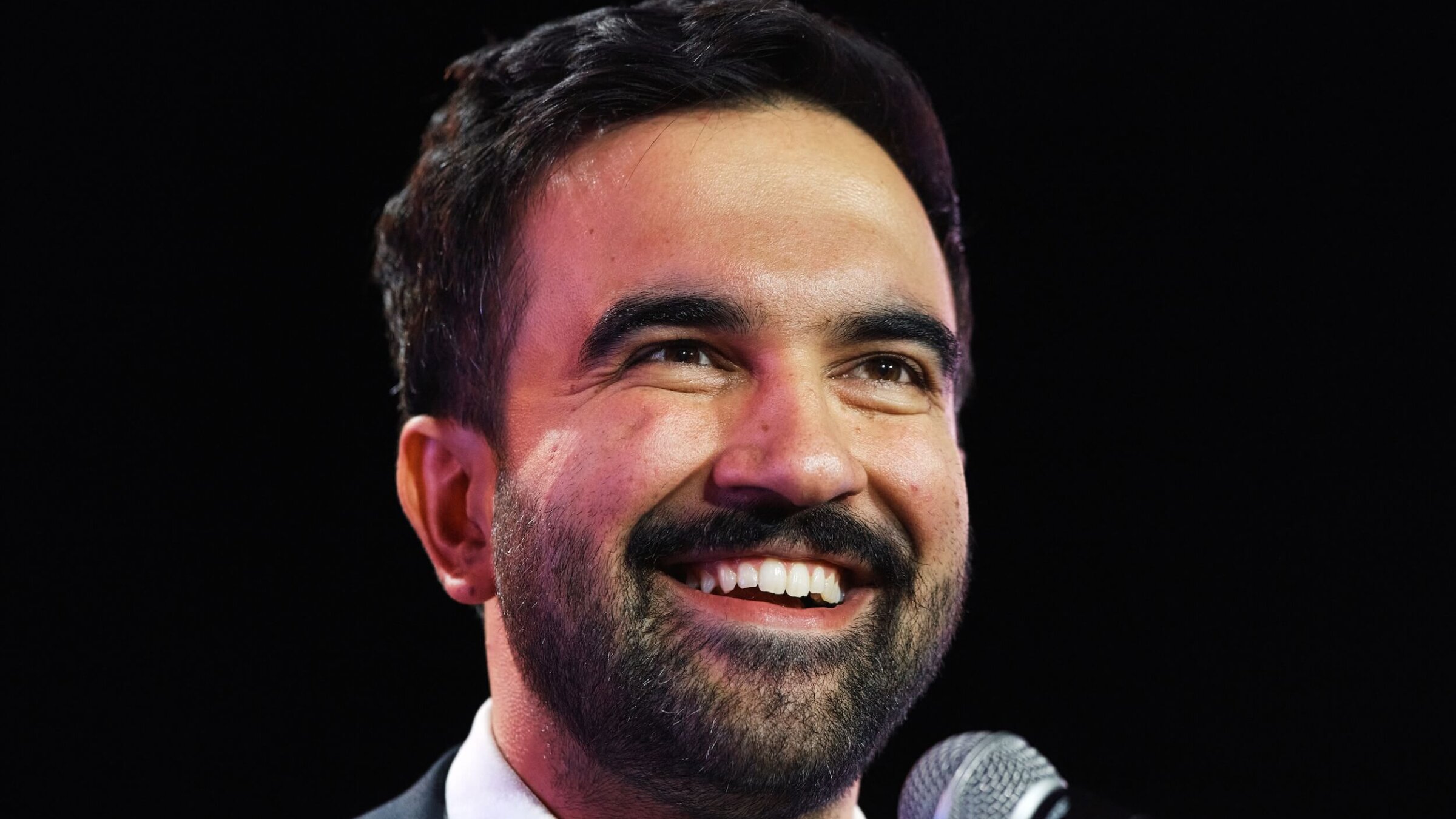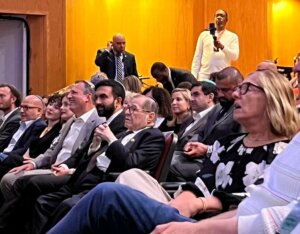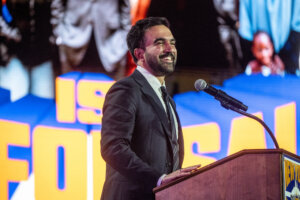How Mamdani built bridges to Jewish New Yorkers, from Williamsburg to Park Slope
Mamdani described his conversations with Jewish New Yorkers as ‘meaningful’

New York City mayoral candidate Zohran Mamdani on Oct. 26. Photo by Andres Kudacki/Getty Images
In his quest to become the first Muslim mayor of the city that is home to the largest Jewish community in the United States, Zohran Mamdani has created a rare coalition of progressive Jews, liberal Zionists, and segments of the Hasidic community.
Mamdani, a democratic socialist and critic of Israel, has been boosted by local Jewish elected officials and embraced by prominent rabbis, even as the frontrunner continues to struggle to earn the trust of many Jewish New Yorkers in the race for New York City mayor.
In a quiet victory, two Satmar Hasidic factions, considered the largest blocs of voters in the Haredi community, on Wednesday declared that they would not endorse any candidate for mayor, while also condemning the “fear campaign” and attacks on Mamdani.
The non-endorsement amounted to an implicit acknowledgment of Mamdani’s ascendancy going into Tuesday’s election. The approximately 80,000 voters in Brooklyn’s Haredi communities, where rabbinic dictates about ballot choices lead to a reliable bloc of support, are particularly sought after by candidates. In previous mayoral elections, the Satmar faction in Brooklyn, led by Rabbi Aaron Teitelbaum from Kiryas Joel and known as the Ahronim, endorsed the eventual winner, even while other Hasidic blocs supported rival candidates.
Cuomo still enjoys broad support among Jewish voters, who make up an estimated 10% of the general election electorate. A recent Quinnipiac poll of 170 Jewish voters showed Cuomo with 60% of their support and Mamdani with 16%, while a separate Marist poll of 792 likely voters — including an 11% sample of Jewish voters — found Cuomo with 55% and Mamdani at 32% among Jewish respondents.
How Mamdani got here

The campaign for mayor has laid bare deep fault lines over Israel, antisemitism and Jewish leadership.
Mamdani’s positions on Israel and his ties to the Democratic Socialists of America have roiled Jews — in New York and across the country — amid rising antisemitism. The Democratic nominee faced scrutiny for: refusing to outright condemn the slogan “globalize the intifada;” reiterating support for Palestinians in his statement on the Gaza ceasefire; vowing to arrest Israeli Prime Minister Benjamin Netanyahu if he visits New York; and saying he doesn’t recognize Israel as a Jewish state. He is the first major-party nominee to pledge public support for the movement to boycott Israel.
Those positions sparked voter registration drives across Brooklyn’s Orthodox community, early voting mobilization efforts, and an unprecedented wave of prominent rabbis, once hesitant to engage in politics, publicly urging support for Cuomo.
But Mamdani wasn’t deterred by the opposition. He attended High Holiday services at Kolot Chaiyeinu and the Lab/Shul, he addressed members of Congregation Beth Elohim for a community conversation earlier this month, and visited Hasidic leaders in South Williamsburg during Sukkot. On the second anniversary of Oct. 7, he appeared at an Israelis for Peace vigil alongside hostage families. Mamdani also published an open letter in Hasidic Yiddish, outlining his plans to combat antisemitism and advance his affordability agenda, and gave an interview to a popular Yiddish magazine, Der Moment.
“I’m hearing from people who either didn’t support him in the primary or ranked him lower on their ballot that they now feel reassured.”Phylisa WisdomExecutive director of the New York Jewish Agenda
Mamdani told the Forward that he “deeply appreciated” the opportunity to meet with a broad spectrum of Jewish New Yorkers across these five boroughs in recent months. “It’s been meaningful to hear their hopes, their dreams, and their concerns for and about this city.”
In his public remarks on the campaign trail, Mamdani said that in those conversations, he assured them he would increase police protection outside houses of worship and Jewish institutions and invest in hate crime prevention programs. He also vowed to retain police commissioner Jessica Tisch, who is Jewish, which was also viewed as a gesture to reassure Jewish New Yorkers worried about rising antisemitism.
Mamdani said he would use a city curriculum in public schools that teaches about Jewish Americans and seems to contradict his own position on Israel. He also assured liberal Zionists that support for Israel would not be a litmus test for serving in his administration.
In an open letter to their followers published on Wednesday, the Satmar leadership highlighted Mamdani’s gestures that specifically addressed their concerns. They noted that the Democratic nominee has said he would work to protect Hasidic yeshivas that face scrutiny for failing to meet state education standards and promised that Hasidic families would benefit from his proposals to expand affordable housing and establish universal childcare.
Jamie Beran, chief executive of Bend the Arc: Jewish Action, a progressive Jewish social justice activist network which issued its first-ever mayoral endorsement for Mamdani, praised his outreach efforts.
“I really do think that he has done a lot to address the concerns of the Jewish community and to build relationships with the Jewish community,” Beran said in an interview. “I really believe him that he’s not just doing that to court votes, but because he genuinely wants to represent all of those constituents when he’s mayor.”
Phylisa Wisdom, executive director of the liberal New York Jewish Agenda, participated in the Beth Elohim community conversation with Mamdani, and said she believes the candidate has made significant progress in engaging Jewish voters since the primary.
“I feel confident that a broad spectrum of Jewish voices have been heard by his campaign,” Wisdom said. “I’m hearing from people who either didn’t support him in the primary or ranked him lower on their ballot that they now feel reassured.”
Unity if Mamdani wins

The prospect of Mamdani winning has already led organizations to issue a call for unity after the election.
The open letter, signed by more than 30 rabbis, progressive leaders and liberal groups, urges New Yorkers to heed the call of the prophet Jeremiah to “seek the peace of the city” we’re in, “to put our backs into making the structures of tomorrow a little bit better than the structures of today. And that means working in the best possible faith with whoever is in City Hall.”
Bend the Arc’s Beran said that the post-election period is an opportunity for bridge-building, both within the Jewish community and across ideological divides. “We need to build a coalition that doesn’t break along our fault lines,” she said. “We need to make space to reckon with them and to be comfortable with some degree of disagreement if we’re going to unite against the forces that are really threatening our safety and livelihoods.”
Mamdani’s administration and his actual record in office could shift perception, she said. “Once people see how he actually governs and how he actually leads, I’m hoping that will open the door for some reconciliation,” she said.
















